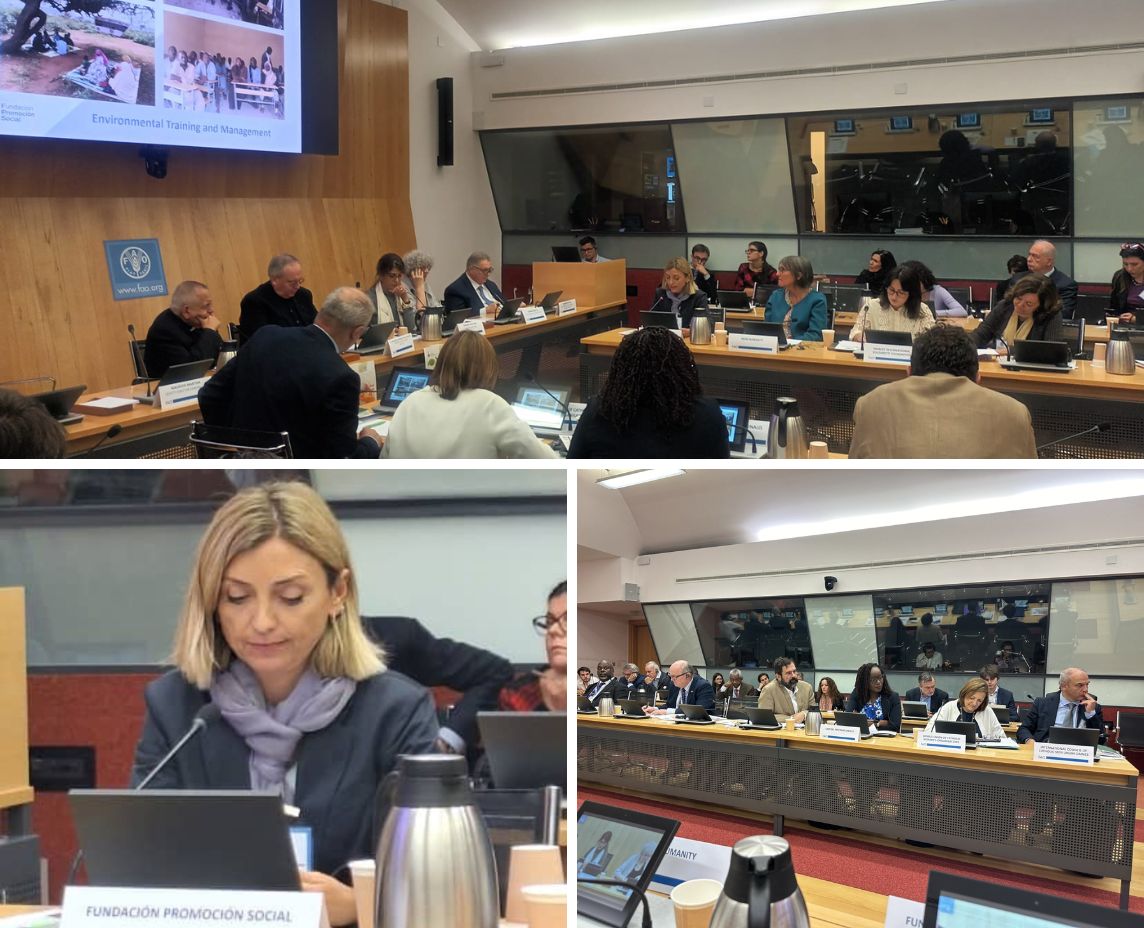On the occasion of World Food Day 2024, a study seminar organized by the Forum of Catholic-inspired NGOs and the Permanent Mission of the Holy See to the UN Headquarters in Rome was held on 10 October at FAO Headquarters (Rome).
The Rome Forum, of which the FPS is a member, encourages more incisive collaboration between entities united by a common vision, promoting coordinated action across United Nations Agencies.
The meeting was opened by Cardinal Peter Kodwo Turkson, Chancellor of the Pontifical Academy of Social Sciences, with a video message in which he noted that, despite the increase in global food production, the number of undernourished people is growing, attributing this paradox to the unequal distribution of food resources and the lack of global solidarity.
The Cardinal stressed the importance of a scientific approach and innovative policies to address the food crisis, underlining the urgent need to develop solutions that can truly alleviate world hunger.
Next up was Professor Simona Beretta, Professor of Economic Policy at the Faculty of Political and Social Sciences of the Università Cattolica del Sacro Cuore, who addressed the issue of international trade rules and their impact on access to food.
She highlighted how protectionist policies and fluctuations in agricultural prices have affected global food security, especially in lower-income countries. She underlined the importance of reforming trade policies to ensure fair access to food, promoting fairer rules that limit the power of big business and support local economies.
Following Professor Beretta’s intervention, Msgr. Robert J. Vitillo, Senior Advisor to the Dicastery for Promoting Integral Human Development, spoke about the seriousness of food waste and its impact on both global poverty and climate change. He stressed that 20% of the food produced in the world is lost or wasted, which contributes significantly to global greenhouse gas emissions.
Bishop Vitillo stressed the urgency of reducing food loss and waste as an essential step towards respecting the right to food and for a sustainable future, and called for concrete measures to reverse this harmful trend.
Maurizio Martina, Deputy Director of FAO, gave a welcome speech, stressing the need to strengthen multilateralism as the only way to achieve the objectives set in the fight against world hunger.
Next, it was the turn of some Non-Governmental Organizations, members of the Rome Forum, to give their testimonies, including the Social Promotion Foundation, which offered an in-depth analysis of its interventions in Ethiopia, one of the nations most affected by the global food crisis.
“Since 2006,” explained Rossella Miranda, FPS delegate in Italy, “The Foundation has invested around 8 million euros to develop 13 programmes in collaboration with the Commission for Social Development of the Ethiopian Catholic Church, concentrating its efforts mainly on the regions of Somalia and Oromia, areas notably vulnerable to climatic disturbances and characterized by limited access to basic services such as water and electricity.”
Miranda explained the holistic and multi-sectoral approach of the FPS, aimed at reducing the vulnerability of rural communities through a series of sustainable and diversified interventions. “In recent years,” she recalled, “efforts have focused on strengthening local agricultural capacities through the introduction of climate-resilient crops and sustainable irrigation systems, as well as promoting domestic agroforestry.”
These efforts have not only improved the availability and quality of food, but have also strengthened the communities’ self-sufficiency in the long term. She also highlighted the attention paid to gender equality, recognizing and empowering the role of women, particularly affected by the climate crisis, in the agricultural process. Women’s participation has proven to be a determining factor in the success of the programmes, as confirmed by an external evaluation in which 12,000 beneficiaries have participated over the past four years.
Our delegate was able to mention the infrastructure works in response to the drought: the Foundation built and rehabilitated wells and reservoirs, guaranteeing access to water for consumption and irrigation to more than 80,000 people. This not only improved the living conditions of the communities, but also contributed to their health.
In addition, the Foundation’s projects emphasize the adoption of local response methodologies, such as “learning by doing” and “farmer and pastoral field school”, which enable communities to adapt and thrive despite challenges.
The recent addition to the FAO-led Working Group on Agriculture is a sign of recognition of the value of the Foundation’s work and its ability to contribute to shared and effective solutions to combat food insecurity in Ethiopia and beyond.
At the conclusion of the seminar, Vincenzo Conso, coordinator of the Rome Forum, presented the Manifesto drawn up by the member NGOs, stressing the importance of concrete and timely actions, recalling the exhortation of Pope Francis and the objectives of the 2030 Agenda, promoting a global commitment to sustainable agriculture and the elimination of hunger.
The final words came from Msgr. Fernando Chica Arellano, Permanent Observer of the Holy See to FAO, IFAD and WFP: “The right to food will become a tangible reality if, leaving all rhetoric behind, we put each person at the centre of our strategies and actions. We cannot be content with producing statistics. It is the people who must count. The data will come later.”





